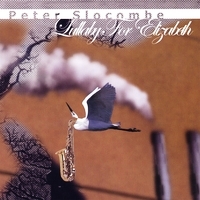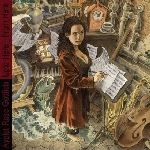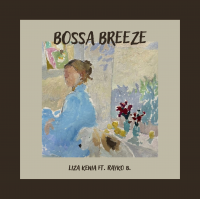Home » Jazz Articles » Live From New York » August 2009
August 2009
Birdland
New York City July 14, 2009
When Frank Kimbrough made his leader debut at Birdland (Jul. 14th), easily one of the best piano showcase rooms in New York, there was no doubt he would meet the lofty standard maintained at the club by such fellow pianists as Steve Kuhn and Marc Copland. Having recently recorded with Paul Motian (Play, 2006), Kimbrough opted to work once again with the iconic drummer (and Birdland regular) in a trio setting, with the commanding, underrated Jay Anderson on bass. As on Play, he led off with "Beginning," an episode of rubato calm and rolling poetic cadences. Motian and Anderson reacted to Kimbrough's color-rich musings with finely honed expansions and contractions of time and phrasing. Motian would hint at tempos even in tempo-less passages, creating the feeling of running in place. If the set seemed to linger on dark, mournful moods and floating meter with Motian's "It Should Have Happened a Long Time Ago" and the traditional "I'm Just a Poor Wayfaring Stranger," this was balanced by Kimbrough's jaunty country blues "Lullabluebye" and his marvelously blocky invention "The Spins," as well as the trio's swinging, loosely spirited readings of "All the Things You Are" and "I Wish I Knew". On the brighter numbers, Kimbrough tended to lay out during Anderson's nimble bass solos, the better to highlight them in every small detail. It was an example of new textural options lurking at every corner, even with a mere three players.
Peter Bernstein
Smalls
New York City
July 15, 2009
Sitting down at Smalls for his first-ever solo guitar gig (Jul. 15th), Peter Bernstein likened the experience to peeing with the door open—"you don't have to stare," he joked to an attentive early evening crowd. Indeed, in this setting one is fully exposed, with no external rhythmic or harmonic support. One is also contending with the precedent established by Joe Pass, Lenny Breau and other masters of a particularly demanding micro-genre in jazz. Bernstein rose to the challenge with an enormously satisfying 12-song set. Having recently issued the trio session Monk on Xanadu, he was able to call on a strong selection of the pianist's tunes, translating their dissonant lyricism to guitar with marked imagination and resourcefulness. He opened with "Pannonica," made a medley of "Introspection" into "Light Blue" into "Coming on the Hudson," then circled back to "Ruby My Dear" before closing with the Sinatra staple "Put Your Dreams Away". The time flowed freely on "Autumn in New York" and "Darn That Dream," yet swing was thick in the air during a gritty waltz rendering of "Yesterdays" and bluesy romps on John Lewis' "Django" and Jimmy McHugh's "Don't Blame Me". Here, in his head, Bernstein seemed to maintain an internal band dialogue. Years of working with masters like Melvin Rhyne and Dr. Lonnie Smith will do that. But hearing Bernstein's instrument by itself—every buzz and burr of steel against wood—was a new pleasure and altogether unique.
—David R. Adler
Steven Bernstein
Castle Clinton
New York City
July 16, 2009
The divide between jazz and R&B in its varying forms is narrow and often crossed; Stanley Turrentine to Wilson Pickett to Roland Kirk to Ray Charles are mere stones' throws. But somehow, inexplicably, the riffy, horn-heavy looseness of Sly Stone has been left largely untouched by the other side of the aisle. Which meant Steven Bernstein could have had an easy job for his Jul. 16th tribute at Castle Clinton, part of a four-night Woodstock recreation. But Bernstein's a showman, a worker, an entertainer and above all a smart arranger and he has too much fun with this kind of thing to go the easy route. Nor was he going to go the easy route by having too much fun. While the songs remained upbeat (if with slow ramps to get there), "Que Sera Sera" as sung by Martha Wainwright was haunting-to-ecstatic and Shilpa Ray's bluesy punk vocals and harmonium on "Everyday People" was more insistently multi-culti than Stone ever managed. Bernstein was lit, snaking Arabesques and hitting backbeats through his nine-piece Millennial Territory Orchestra (archtop guitar and upright bass in a funk band!) with guests Bernie Worrell and Vernon Reid. But the focus was on the vocalists. Sandra St. Victor opened the show by embodying "Stand," but the linchpin was the astounding Dean Bowman. He and Stone are two of the world's very few yodeling funkmen. The two finally got the audience off its feet for the last song, a forceful "Dance to the Music".
Gold Sparkle
Zebulon
Brooklyn, NY
July 13, 2009
God bless Gold Sparkle. Through varying lineups (and two cities), Charles Waters and Andrew Barker have been keeping the faith for some 15 years now, way back to their Georgia days and, well, if it's been 2008 at any rate since we saw them last, their hard-driven swing and hard-swinging drive are always welcome. On this occasion, Jul. 13th at Zebulon, they were, as Waters introduced them, the "Gold Sparkle Sextet Minus One You Do The Math". They opened with a new composition, "New for Henry," dedicated to Mr. Threadgill. The piece angled almost immediately into a screaming guitar solo by Jeremy Wilms that made it a bit of "New for Brandon Ross" too, followed by Waters' own alto solo that seemed to bounce off the dedicatee's penchant for triplets. The second of the three long, open pieces, took advantage of the horn players' second instruments. "Sun Row" nicely played Waters' B-flat against (usually) trumpeter Matt Lavelle's bass clarinet for an unexpected, free-range ballad. They closed by pushing over the top with the manic, screaming, pounding "Trip Busy," which felt like one-sixth of an Albert Ayler riff played incessantly until fragmenting into fractals. Through it all, Barker and bassist George Rush proved a firm backing. The former especially is a solid and steady player, which no doubt is why he's been Waters' drummer of choice for all these years. The compositions are Waters,' but Barker knows just how hard to push. Or how much to sparkle.
—Kurt Gottschalk
Toshiko Akiyoshi & Lew Tabackin
Birdland
New York, NY
July 2, 2009
Musical and marital partners for almost four decades, pianist/composer/arranger Toshiko Akiyoshi and tenor saxophonist/flutist Lew Tabackin have developed strong chemistry. Their big band, long a Monday night fixture at Birdland, is defunct but the pair still plays an annual gig at their old digs. On Jul. 2nd, accompanied by Phil Palombi (bass) and Mark Taylor (drums), the dynamic duo rekindled the old excitement, delivering an inspired set that maintained its rhythm and flow, from the scampering pentatonic melodies of Akiyoshi's solo introduction to "Long Yellow Road" through to Tabackin's closing cadenza on "Chasing After Love" (a rewrite of Richard Rodgers' "Lover"). On "Serenade to Sweden" (a "derangement" he joked, of Ellington's original) and "Eulogy," excerpted from Akiyoshi's suite-length tribute to the Duke, the tenor man sounded like a latter-day Johnny Hodges or Ben Webster, his breathy vibrato and scooped attacks the epitome of tough romanticism. In contrast, his flute playing, punctuated with dramatic pauses and bird-call emulations, evoked the sound of the Japanese end-blown shakuhachi. On "Sumi-e" (named after the spontaneous, minimalistic school of East Asian painting) and then on Coltrane's "Wise One," his impressionistic solos seemed to tell stories or sketch specific scenes. Akiyoshi romped over Bud Powell's "Un Poco Loco," accentuating her short, chromatically intricate phrases with leg kicks.
Diego Voglino, Ben Monder, Chris Lightcap
Royala
Brooklyn, NY
July 14, 2009
Royale, a next-door-neighborly pub tucked away in Park Slope, Brooklyn, has hosted Tuesday night jam sessions for over a year. On Jul. 14th, house drummer Diego Voglino invited guitar wiz Ben Monder and bassist Chris Lightcap for a relaxed but intense set. Progressing through the standards "I'll Remember April," "This Is New" (a lesser-played Kurt Weill/Ira Gershwin gem) and "Lover," the trio closed with a rocking cover of "World of Pain" (from Cream's Disraeli Gears). The intensity grew gradually, buoyed by Monder's intelligent, fluidly rendered melodies and complex chords with subtly shifting inner voices, climaxing with a shredding solo, a stylistic pastiche of Eric Dolphy and psychedelia. The following jam session included local talents JD Allen (tenor), Aruan Ortiz (keys) and Sebastian Noelle (guitar) and many more. Working out over "Airegin," "There Is No Greater Love" and "Out of Nowhere," with a new lineup for each tune, the session maintained a high level of craftsmanship, with disciplined, to-the-point solos, even on the final "Blue N Boogie" blues, featuring simultaneous blowing by nine horns. It was exciting to watch these hungry-to-play musicians take chances and extend themselves, occasionally stumbling but most often prevailing. Monder and Co. returned for the final hit: Jimmy Webb's "Wichita Lineman," featuring country-meets-soul comping, "Rhythm-A-Ning" (with Allen) and a slow-shuffling, slightly fractured G-blues.
—Tom Greenland
Charles Lloyd
Highline Ballroom
New York City
July 3, 2009
Since his earliest days as a leader Charles Lloyd has demonstrated the rare ability to reach audiences outside of the jazz mainstream without in any way diluting his music's integrity. So his appearance at the Highline Ballroom (Jul. 3rd), a room that seldomly hosts jazz artists, was more of an anomaly for the popular youth palace than its veteran headliner. Lloyd turned in a characteristically eclectic set, kicking things off on tarogato, a soprano sax-like instrument, improvising a solo that blended Indian music and straight-ahead jazz in the manner of which he is one of the greatest living masters. Switching to tenor saxophone for a poignant reading of Billy Strayhorn's "Bloodcount," he exhibited the alluring personal sound, rooted deeply in his love of both Lester Young and John Coltrane, which is at the heart of his appeal. With his feet planted firmly and upper body swaying with the rhythm he blew passionately over his band of young veterans—pianist Jason Moran, bassist Reuben Rogers and drummer Eric Harland—whose sensitive interaction with each other and their leader resulted in an almost constant flow of magical moments during the set of mostly Lloyd originals that followed. The pastoral beauty of "Blow Wind" and "Tone Poem" gave way to the Latin feel of "Passin' Thru" and Silvio Rodríguez' ballad "Rabo de Nube," earning the group a standing ovation, after which they returned to play "The Water Is Wide" and a final flute feature, "Booker's Garden".
Billy Harper
MOMA Sculpture Garden
New York, NY
July 12, 2009
An overflow crowd spilled out along 54th Street to hear the Billy Harper Quintet's performance in the Museum of Modern Art's sculpture garden (Jul. 12th). Harper, who has a compositional style as distinct and grand as his colossal Texas tenor tone, presented a program that filled the Museum's canyon-like outdoor oasis with rhythmically charged music that made for a truly memorable New York summer night. With the powerful trumpeter Freddie Hendrix filling out the frontline and perennial quintet constituents Francesca Tanksley and Clarence Seay, on piano and bass, joined by McCoy Tyner alumnus Aaron Scott on drums, the band set the mood for the evening with the leader's "Illumination," a pulsating tune mixing modal and straight-ahead improvisational lines by the composer; his exciting register-leaping solo had people cheering wildly both in the garden and on the street outside. Following with "Africa Revisited," a reworking of Coltrane's "Africa" (featuring a fiery recitation by Amiri Baraka on the band's newest CD), and a dramatic stoptime arrangement of the standard "My Funny Valentine," the saxophonist displayed the rare ability to make even the most familiar material his own. This was again made evident with his "Soran Bushi, B.H.," an original inspired by a Japanese folk melody that combined legato and staccato lines in an intoxicating brew of East-meet-West lyricism that elicited vocal approval from the audience that grew even louder following the set closer "Priestess".
—Russ Musto
Recommended New Listening:
* Fred Anderson—Staying in the Game (Engine)
* Ralph Bowen—Dedicated (Posi-Tone)
* James Falzone's Klang—Tea Music (Allos Documents)
* Nicole Mitchell's Black Earth Strings—Renegades (Delmark)
* Edward Simon Trio—Poesía (CAMJazz)
* Jack Wilkins—Until It's Time (MAXJAZZ) —David Adler NY@Night Columnist, AllAboutJazz.com
* Mon David—Coming True (FreeHam)
* Ayelet Rose Gottlieb—Upto Here | From Here (Obliqsound)
* The Inbetweens—Quantum Cowboy (Layered)
* Masada Quintet—Book of Angels, Vol. 12: Stolas (feat. Joe Lovano) (Tzadik)
* Herb Robertson/Mark Solborg—[NOD · ] (ILK Music)
* TriBeCaStan—Strange Cousin (Evergreene Music)
—Laurence Donohue-Greene Managing Editor, AllAboutJazz-New York
* Darcy James Argue's Secret Society—Infernal Machines (New Amsterdam)
* Michiel Braam's Wurli Trio—Non-Functionals! (BBB)
* Anthony Braxton + Italian Instabile Orchestra—Creative Orchestra (Bolzano) 2007 (Rai Trade)
* Brötzmann/Kondo/Pupillo/Nilssen-Love—Hairy Bones (Okkadisk)
* The New Mellow Edwards—Big Choantza (Skirl)
* Nate Wooley/David Grubbs/Paul Lytton—Seven Storey Mountain (Important)
—Andrey Henkin Editorial Director, AllAboutJazz-New York
Tags
PREVIOUS / NEXT
Support All About Jazz
 All About Jazz has been a pillar of jazz since 1995, championing it as an art form and, more importantly, supporting the musicians who make it. Our enduring commitment has made "AAJ" one of the most culturally important websites of its kind, read by hundreds of thousands of fans, musicians and industry figures every month.
All About Jazz has been a pillar of jazz since 1995, championing it as an art form and, more importantly, supporting the musicians who make it. Our enduring commitment has made "AAJ" one of the most culturally important websites of its kind, read by hundreds of thousands of fans, musicians and industry figures every month.



























